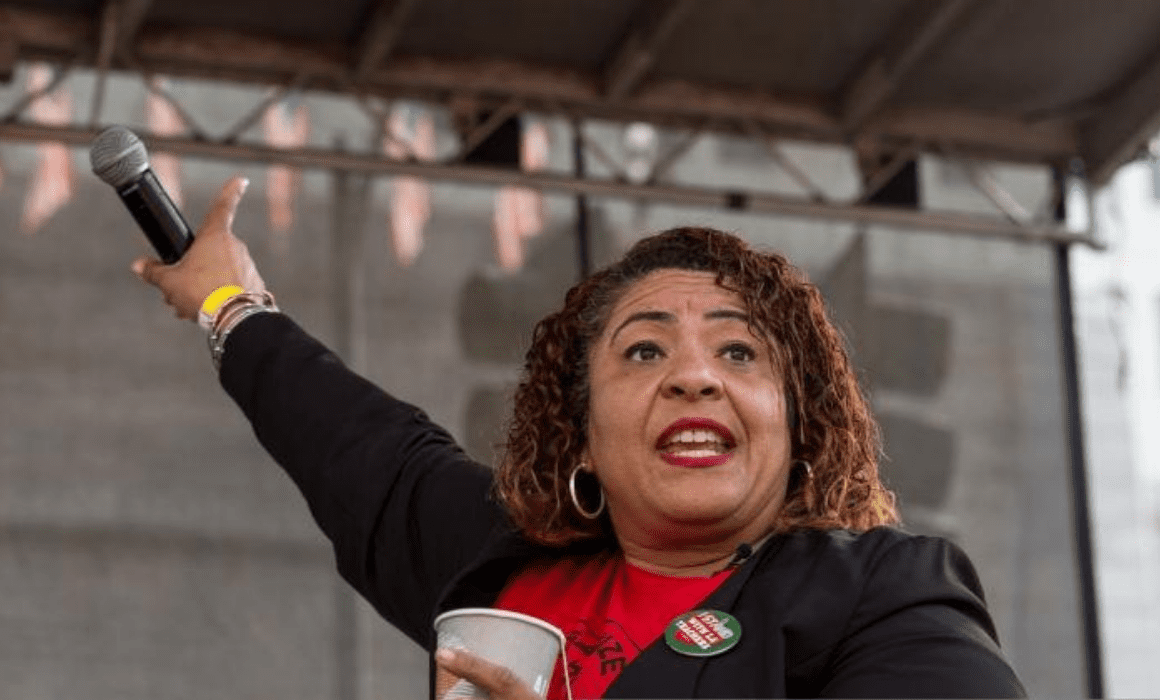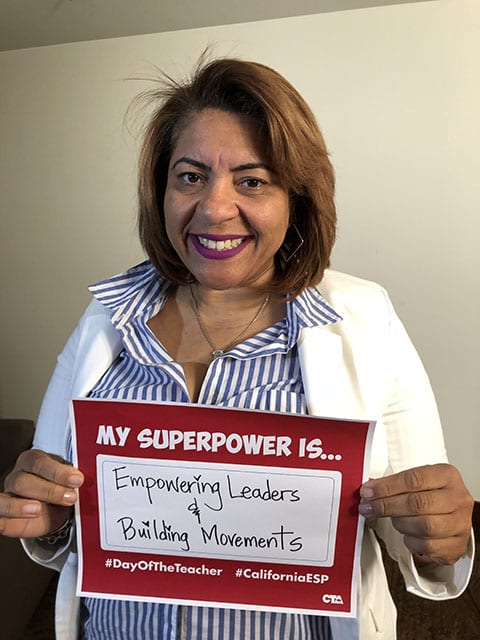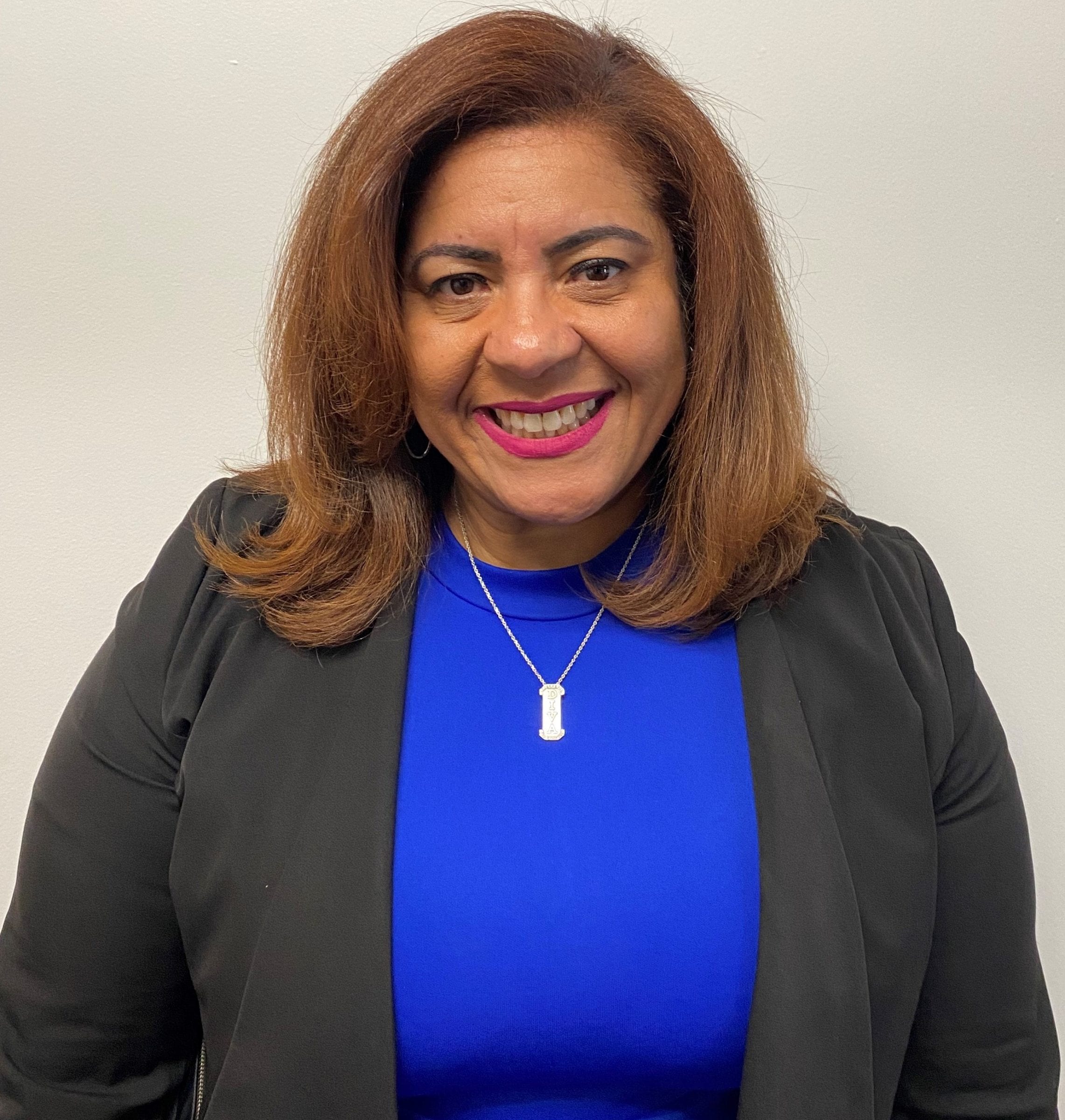
Cecily Myart-Cruz was elected president of the 35,000-member United Teachers Los Angeles in February. The longtime educator and activist is the first woman of color to lead UTLA since its founding in 1970. She has played a key role in UTLA’s organizing and actions in the second-largest school district in the nation, including the historic strike that saw more than 30,000 educators take to LA streets in 2019.
Recently, UTLA’s advocacy helped persuade the LAUSD school board to cut its police budget by $25 million and redirect money to school counselors and other school support services.
An ardent social and racial justice advocate, Myart-Cruz is chair of the NEA Black Caucus and has been a member of NEA’s Peace and Justice Caucus and Hispanic Caucus, among others.
We checked in with the single mother and LAUSD parent as she assumed office in July.
Why did you want to become a teacher?

I wanted to change student lives, and I wanted to be involved with children. When I was in high school and college, I saw being a teacher or a child psychologist as an opportunity to make a real difference.
I taught first and second grade in Compton for three years, before coming to LAUSD as a fifth grade teacher and then as a second grade Intensive Academic Support teacher at Arlington Heights — right down the street from where I grew up. That was a challenge — those students had already failed second grade, they couldn’t read, they didn’t recognize letters. I had to bring them up to speed from a pre-K level to third grade by the end of the year.
After a few years I ended up at Emerson Middle School teaching sixth grade English — and middle school has been my niche ever since.
Did any of your own teachers inspire you growing up?
Many, but one in particular was my fifth grade teacher, Shelley Banks. She was fantastic. She was a strong Black woman who really pushed us. She made a real difference in my life. She was tough — she didn’t take any crap — but she opened her room at lunchtime and recess to help us, something I’ve tried to do as much as possible as well. She was also big on critical thinking. She didn’t just dump information into our heads, she taught us to think.
I do the same. I’m an unconventional teacher. The mandated textbooks generally gather dust on my shelf because I address the standards but work with a broader group of materials. I have kids keep journals and write down their thoughts. I have my kids read To Kill a Mockingbird. People say it’s a 10th grade novel, but I say it’s a book that needs to be read several times. You get something out of it each time. Those younger students get a lot out it, and they empathize with Tom Robinson being accused of something he didn’t do.
It really warms my heart when I hear from former students that I made a difference in their lives. With the recent uprisings, I’ve been hearing a lot from former students. I recently heard from one: “Hi Miss Cruz — I don’t know if you remember me (I did) — I was in your third period and I saw your post about another student and just wanted to thank you for teaching us about racism and racial bias and how it situates itself in our society. Thank you for teaching my classmates and me the concepts of prejudice and bias, as well as the implications of our conscious and subconscious actions. Thank you for teaching me and my classmates about other important topics such as sexual violence, classism, sexism, LGBTQ+ identities, privilege, and the immensely broken and outdated criminal justice system in the United States. Your class was one of the most influential I’ve ever taken — you shaped who I am as a person and a member of society. Thank you again.” Those callbacks from former students are wonderful.
How did you get involved in the union?

I was an SEIU rep when I started as a classified teaching assistant in LA. Then during my second year teaching in Compton, somebody said I’d be great as a building rep. When I moved to LAUSD and joined UTLA, I started at a school with a real problem principal. She had been there nine years and had scared away employees — maintenance workers, teachers. She was just vindictive. So I walked into that environment, and it was compounded by no books, no supplies. I knew I would need the union to help turn this around. I went to a union meeting and found several other former Compton teachers sitting together. They gave me “the look” when they found out where I was teaching and who my principal was. They told me I’d have to talk to a guy named Duffy [former UTLA President AJ Duffy] if I wanted help changing that school.
I sought him out, and that encounter changed my life. He became a mentor. I know he was a controversial figure — he could be super brash. But he told me we could get rid of that bad principal if I followed his lead. We worked together and got rid of that bully principal. He passed away last year, but he believed I could become president, and in his eyes I could be a great one. His advice to me was: “Give ’em hell!”
But after that first meeting I became more active, moving from assisting our site chapter chair to being a chapter chair, then serving at just about every role and layer at UTLA.
What does it mean to you as a woman of color and longtime activist to be leading UTLA at this time?
UTLA is 50 years old. Our profession is 70 percent women, yet we’ve only had three women presidents and none for three decades. So to be a woman and a woman of color is important, but I don’t collect titles, and it’s not the lens I see my role primarily through. The work speaks for itself.
But it is important, and when I stop and think about it, it makes it all that much more meaningful — especially when I think of my father, who is no longer here to see what I’ve become. He always told me, “You can reach for the stars, and you’ll catch them all.” So when I get racist email or hateful posts on social media, I share it with my board so people can see what we’re up against, but I don’t let it stop me. It lets me know I must be doing something right.
What do you hope to accomplish?
I knew taking on this role would mean changing UTLA. I want us to look at issues through more of a racial and social justice lens. Just look at what is happening in our country and in the world now. The uprisings against police brutality are exposing what has always been there. COVID-19 is exposing the harsh inequities for working-class people, and even more so for Black and brown people. We need to have courageous, difficult conversations, and we need to build and strengthen relationships with our communities that aren’t purely transactional. We need to listen, even when what people are saying is difficult.
In an EdSource article, you said we should “be actively promoting Black Lives Matter.” Where should we start?
We have to start with courageous conversations. Black Lives Matter is inclusive. It doesn’t mean anyone’s life is less important — exactly the opposite. Because of movements like Black Lives Matter, we’re seeing an end to the Redskins name and the eventual end of other native names used for mascots. It will help end the cages the government is putting Latino families into.
What can educators do?
White educators can play a big role, especially in talking to other white educators. We have to look at policies and practices, and update them to reflect reality. COVID has been horrible, but it has given us a forced opportunity to address some of the inequities built into our education system.
We all have a role to play. My UTLA colleague CTA Board member Erika Jones and I have a “Black Lives Matter in Schools” workshop we’ve done across the nation. We have to all look at our own internal biases, and then do what it takes to end the school-to-prison pipeline that impacts so many students of color. Teacher prep programs need to better address these issues, and ethnic studies need to be a part of every new teacher’s background. The unions need to take the lead on all this.
Talk about UTLA’s recent push to defund or disband school police.
Students Deserve have been the real leaders calling for defunding — this was their third campaign. The first was ending random searches. The second was Black Lives Matter in Schools. They tackled ending pepper spray. UTLA was proud to help them with this latest effort.
I want us to continue to work with students and community groups. We need to listen to our students and stop criminalizing behavior when we have much better ways to address the roots of those behaviors. And even if we can’t solve them right away, we can still listen and acknowledge the lack of a meal or the home or homelessness situation that may be behind why a student just isn’t with it today.
Is any of your family involved in your work?
[Laughs.] Oh, they’re involved all right! My mom and 9-year-old son Giovanni come to every NEA RA. Gio’s first was when he was 7 or 8 months old. This year it was virtual, so that was a disappointment for us all. Gio was even with me a couple of weeks before he was born when we were protesting the LA Times reporters who were publishing teacher evaluation data, which drove one young man to suicide. He’s been with me at rallies, during the strike — he leads chants! On one of his school field trips he was walking down the street with his class chanting, “We are the union, the mighty, mighty union!” His first rally was CTA’s State of Emergency rally at Pershing Square in 2011 when he was 4 months old.
Are you active in other social justice causes?
I’m chair of the NEA Black Caucus. I’ve been a member of the Peace and Justice Caucus, the Hispanic Caucus, other ethnic caucuses, EMAC-NEA. I’m interested in anything that will help make the world better for marginalized kids. If you fix things for them, you fix things for others. A change is going to come if we continue the work of listening and seeing the absolute humanity in our students, and then do whatever it takes to lift them up and protect them. I was fortunate enough to meet the late Congressman John Lewis who just passed. He advised us to get into “good trouble — get in the way — continue getting in the way.” I take those words very seriously. I have to.